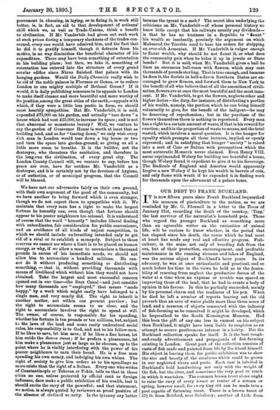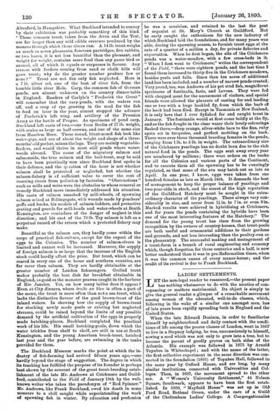OUR DEBT TO FRANK BUCKLAND.
IT is now fifteen years since Frank Backland bequeathed his museum of pisciculture to the nation, as we are reminded by Mr. G. Ffennell in a letter to the Times of January 21st, recording the death of the monkey, Tiny,' the last survivor of the naturalist's household pets. Those who regard the younger Buckland as something more than an agreeable writer on the curiosities of animal life, will be curious to know whether, in the period that has elapsed since his death, the cause which he had most at heart has made any real and effective progress. Fish- culture, in the sense not only of breeding fish from the ova, but of their protection, encouragement, and profitable maintenance in the running streams and lakes of England, was the serious object of Buckland's later years. In its advocacy, he was at once enthusiastic and practical, and so much before his time in the views he held as to the desira- bility of rescuing from neglect the productive forces of the water at a time when .no expense or trouble was spared on
improving those of the land, that he had to create a body of opinion in his favour. In this he partially succeeded, mainly by his personal charm and the readiness of his pen. When he died he left a number of reports bearing out the old proverb that an acre of water yields more than three acres of
land, and a museum of objects connected with the industry of fish-farming as he conceived it might be developed, which he bequeathed to the South Kensington Museum. Had this been the gift of any one less in earnest on his subject than Buckland, it might have been liable to suspicion as an attempt to secure posthumous interest in a hobby. But the Buckland collection speaks for itself. It is the best rough- and-ready advertisement and propaganda of fish-farming existing in London. Great part of the collection consists of casts of fish made and painted from life by Buckland himself. His object in leaving them for public exhibition was to show the size and beauty of the creatures which could be grown in our neglected rivers and pools. Each cast is labelled in Buckland's bold handwriting not only with the weight of the fish, but the river, and sometimes the very pool or reach in which it was taken. The common brown trout alone ought to raise the envy of every owner or renter of a stream or spring, however small, for every tiny rill can be made into a pool capable of fattening trout. There is a brown trout of 13 lb. from Britford, near Salisbury; another of 11 lb. from Alresford, in Hampshire. What Backland intended to convey by their exhibition was probably something of this kind. 4. These common trout, taken from the Avon and the Test, are far larger than any wild edible creature produced by the manors through which those rivers run. A 14 lb. trout weighs as much as seven pheasants, fourteen partridges, five rabbits, -or two hares, it is not less beautiful than the pheasant, and weight for weight, contains more food than any game bird or animal, all of which it equals or surpasses in flavour. Any stream with feeders coming from sand or chalk hills will grow trout; why do the greater number produce few or none ? " Trout are not the only fish neglected. Here is a 7 lb. silver eel, one of the best of river fish, from the humble little river Mole. Carp, the common fish of German ponds, are almost unknown on the country dinner-table in England. Readers of Carlyle's " Frederick the Great" will remember that the carp-ponds, with the waters run off, and a crop of rye growing in the mud for the fish to feed on later in the year, almost stopped the advance of Frederick's left wing and artillery of the Prussian Army at the battle of Prague. As specimens of pond carp, Buckland left casts of two,—one from Berlin of 27 lb. weight, with scales as large as half-crowns, and one of the same size from Haarlem Mere. These round, blunt-nosed fish look like water-pigs, and are of about the weight and shape of a three- months'-old porker, minus the legs. They are mainly vegetable- feeders, and would thrive in most still ponds where water- weeds abound. The cause of the migratory salmon and salmonoids, the true salmon and the bull-trout, may be said to have been practically won since Buckland first spoke in their defence, and the grestion of the hour is not whether salmon shall be protected or neglected, but whether the salmon-fishery is of sufficient value to cover the cost of rescuing rivers from pollution by factories. " Obstructions " such as mills and weirs were the obstacles to whose removal or remedy Buckland more immediately addressed his attention. His casts of salmon smashed by mill-wheels, of spawning salmon seized at Billingsgate, with wounds made by poachers' gaffs and hooks, his models of salmon-ladders, and protective grating and guards for mill-heads and water-wheels at South Kensington, are reminders of the danger of neglect in this direction ; and his cast of the 70 lb. Tay salmon is left as a perpetual record of the return which a protected fishery may make.
Beautiful as the salmon are, they hardly come within the scope of practical fish-culture, except for the export of the eggs to the Colonies. The number of salmon-rivers is limited and cannot well be increased. Moreover, the supply of foreign salmon is so large that the increase of the English stock could hardly affect the price. But trout, which can be reared in every one of the home and southern counties, are far rarer than salmon. They are hardly obtainable at the greater number of London fishmongers. Grilled trout makes probably the best dish for breakfast obtainable in England, as good as the monster prawns caught in the harbour of Rio Janeiro. Yet, on how many tables does it appear ? Even at City dinners, where truite au bleu is often a part of the menu, the trout is more often than not a sea-trout, which lacks the distinctive flavour of the good brown-trout of the inland waters. In showing how the supply of brown-trout for stocking newly made pools or existing but neglected streams, could be raised beyond the limits of any possible demand by the artificial cultivation of the eggs in properly made hatching-places, Buckland completed the practical work of his life. His small hatching-pools, down which the water trickles from shelf to shelf, are still in use at South
Kensington, and the young American brook-trout, hatched last year and the year before, are swimming in the tanks provided for them.
The Buckland Museum marks the point at which the in- dustry of fish-farming had arrived fifteen years ago,—one hardly beyond the stage of suggestion. The degree in which its teaching has fulfilled the purpose of its founder is perhaps best shown by the account of the great trout-breeding estab- lishment of the late Mr. Andrews at Crichmere and Guild- ford, contributed to the Field of January 19th by the well- known writer who takes the pseudonym of " Red Spinner." 11.r. Andrews, like Frank Buckland, owed his death in some measure to a chill caught while superintending the work of spawning fish in winter. By education and profession he was a musician, and retained to the last the post of organist at St. Mary's Church at Guildford. But he early caught the enthusiasm for the new industry of which Backland laid the foundations, and for many years was able, daring the spawning season, to furnish trout eggs at the rate of a quarter of a million a day, for private fisheries and exportation. When he first began, the site of the Crichmere- ponds was a water-meadow, with a few cress-beds in it. " When I first went to Crichmere," writes the correspondent of the Field, " there were eighteen ponds, and the last time I found them increased to thirty-five in the Crichmere meadows,. besides pools and falls. Since then ten acres of additional land has been included, and a number of narrow ponds created. Very proud, too, was Andrews of his pet stud fish, magnificent specimens of fontinalis, fario, and Levens. They were fed with chopped meat for the amusement of visitors, and special friends were allowed the pleasure of casting for and landing one or two with a huge hackled fly, from which the barb of the hook had been filed. Except in Tasmania or New Zealand, it is only here that I ever flyfished for and caught trout in January. The fontinalis would at first come boldly at the fly,. and as the fish fought in the clear water their lovely colourings flashed there,--deep orange, silver-white bars to the fins, ruby, spots set in turquoise, and perfect mottling on the back. There were over three thousand breeding females in the ponds, ranging from 1 lb. to 5 lb. in weight. The extraordinary size- of the Crichmere yearlings has no doubt been due to the rich natural food in the ponds. The eggs sent away every year are numbered by millions ; there were orders on the books- for all the Colonies and various parts of the Continent, and to execute them all the spawning has to be cunningly regulated, so that some of the ova may hatch out as late as April. In one year, I know, eggs were taken from one- hundred females as late as March 24th. It demands the best of management to keep the proper balance of yearlings and two-year-olds in stock, and the secret of the high reputation of the Guildford Hatchery must be sought in the extra- ordinary character of the yearlings. These always vary con- siderably in size, and occur from .% in. to 7 in. or even 8in, Marked results were achieved in hybridising at Crichmere, and for years the ponds containing the hybrids have been one of the most interesting features of the Hatchery." The demand for the young trout has risen from the growing recognition by the owners of country-houses, that trout-pools.• are both useful and ornamental additions to their gardens and grounds, and not less interesting than the poultry-run or the pheasantry. The successful making and management of a trout-farm is a branch of rural engineering and economy which, though forgotten for three centuries and a half, is now better understood than it was in pre-Reformation times, when it was the common annex of every manor-house; and the- credit of its revival is due to Frank Buckland.



















































 Previous page
Previous page